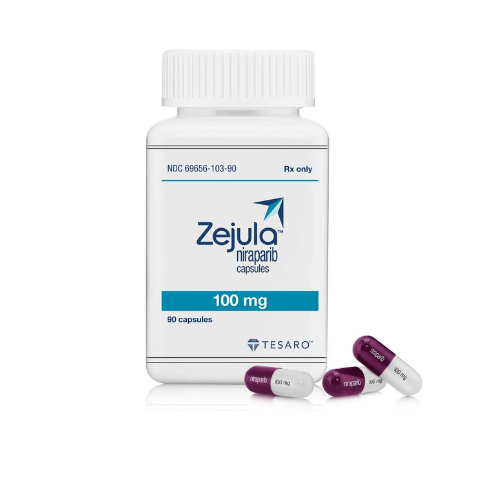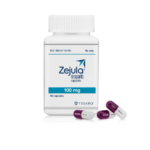About Niraparib or Zejula
- Niraparib, marketed as Zejula, is an oral anti-cancer medication approved by the FDA on March 27, 2017. Niraparib is an antineoplastics which belongs to the family called as PARP Inhibitors.
- As a PARP inhibitor, it is prescribed for the treatment of epithelial ovarian, fallopian tube, or primary peritoneal cancer.
- Zejula is specifically indicated for the maintenance treatment of adult patients who have responded to first-line platinum-based chemotherapy and those with recurrent disease who have shown a complete or partial response to platinum-based chemotherapy.
- PARP proteins play a crucial role in aiding damaged cells in self-repair. Niraparib functions by inhibiting the activity of PARP proteins, preventing their normal functioning.
- This inhibition disrupts the repair mechanism, potentially causing cancer cells to accumulate irreparable damage, leading to their demise.
Strength:
Bottle of 90 and 30 Niraparib capsules are delivered in a strength of 100 mg respectively for oral consumption.
Recommended Dosage:
The Niraparib capsules must be taken at the same time each day until disease progression or unacceptable toxicity. The capsules must not be broken, chewed, or split but swallowed as whole. Niraparib capsules can be swallowed with or without food.
- The recommended dose is 200 mg (two 100-mg capsules) given orally once daily for patients weighing less than 77 kg (170 lbs) OR with a platelet count of less than 150,000/L.
- The recommended dose is 300 mg (three 100-mg capsules) given orally once daily for patients weighing greater than 77 kg (170 lbs) OR with a platelet greater than or equal to 150,000/μL.
Important: Patients must consult their treating doctor in case of experiencing any severe reactions.
Warnings & Precautions
- Patients following the Niraparib treatment have developed MDS/AML, some of which were fatal. It is necessary to assess patients for hematological damage and discontinue the treatment if MDS/ AML (Myelodysplastic Syndrome/Acute Myeloid Leukemia) is found.
- For the first month, it is necessary to monitor the total blood count every week (Bone Marrow Suppression). This administration can be followed by an every month monitoring for the next 11 months, and then, check often for clinically significant changes.
- For the two initial months, it is necessary to monitor the blood pressure weekly (Cardiovascular effects). This can be followed by a monthly administration for the first year and periodically during the Niraparib treatment.
- Females with the potential of reproduction must be advised to take effective contraception as Niraparib capsules can cause fetal harm (Embryo-fetal toxicity).
Common Niraparib Side Effects
- Nausea
- Thrombocytopenia
- Anemia
- Fatigue
- Constipation
- Musculoskeletal pain
- Abdominal pain
- Vomiting
- Neutropenia
- Decreased appetite
- Leukopenia
- Insomnia
- Headache
- Dyspnea
- Rash
- Diarrhea
- Hypertension
- Cough
- Dizziness
- Acute kidney injury
- Urinary tract infection
- Hypomagnesemia
Use in Specific Population
- Due to its mechanism of action, Zejula has the potential to cause fetal harm if administered to pregnant women.
- There is a lack of data concerning the presence of niraparib or its metabolites in human milk, as well as their impact on breastfeeding infants and milk production. As a precaution against serious adverse reactions in breastfed infants, lactating women are advised not to breastfeed during Zejula treatment and for one month after the final dose.
- Prior to initiating Zejula treatment, it is recommended to confirm the pregnancy status of females of reproductive potential.
- Additionally, females of reproductive potential should employ effective contraception during Zejula treatment and for at least six months following the last dose.
- Animal studies suggest that Zejula may affect male fertility.
- The safety and effectiveness of Zejula in pediatric patients have not been established, and while no significant differences were observed in older individuals, their potential heightened sensitivity cannot be ruled out.
- Dose adjustment is unnecessary for patients with mild hepatic impairment, and the recommended dose for patients with severe hepatic impairment has not been established.
Storage and Handling
- Bottle of 90 counts (100 mg)
- Bottle of 30 counts (100 mg)
Store at 20°C to 25°C.
For the medicine procurement, we follow a simple four-step process.
- Enquiry about the medicine: You make a request for information on the medicine you need, and we process your data. Within 24 hours, our Named Access Program Support team will contact you and offer you the necessary assistance.
- Verification Process: As we assist patients in finding medications that are not yet approved and readily available in their home countries, Sansfro must confirm the availability and approval of the medicines they need. We also check the patient’s prescription and medical information.
- Sourcing the Medicine: After completing the verification process, our team will connect with our (network of suppliers) to find your medicine. Following the process, our team gets the best quote of the medicines for you and ensures processing.
- Safe Delivery: We will set up the consignment’s safe delivery after the final quote is approved. Additionally, our logistics experts can help you track your consignment. The Named Access Program industry has a large number of unauthorized channels. To provide the medications safely and legally, we do so by adhering to the Standard Operating Procedures.
When importing medication, we will need the following documents from the patient:
- A valid prescription copy.
- An identity proof document.
- Details of the attending healthcare professional.
- A current address.
Once we have all these documents, the Sansfro team will initiate the application process for an import license. This license is essential to ensure that we can obtain the necessary medication once it receives government approval.
No news found.
About Sansfro
Sansfro is committed to bridging the healthcare gap. Our purpose is to bring hope and healing to patients suffering from rare diseases by linking them with life-saving treatments through our Named Patient Program. Join us in our quest for a better and healthier world.
Know More...FAQ'S
How does Niraparib work?
An enzyme termed poly (ADP-ribose) polymerase (PARP), which helps cancer cells in treating DNA damage, is blocked by the PARP inhibitor Zejula. Niraparib can assist in preventing cancer cells from repairing their DNA which ultimately leads to their death.
Who is Niraparib suitable for?
Adult patients with recurrent ovarian, fallopian tube, or peritoneal cancer who have completed full or partial platinum-based chemotherapy are eligible for maintenance treatment with Zejula.
What is the recommended dosage of Niraparib?
Zejula or Niraparib capsules are available to be taken orally. The recommended dosage of Niraparib is 200 mg for patients weighing less than 77 kg and 300 mg for patients weighing greater than 77 kg.
What are the common Zejula side effects?
Nausea, exhaustion, vomiting, constipation, headache, reduced appetite, and low red or white blood cell counts are some of the more typical Zejula side effects. The consulting doctor must administer the patient for any reactions and changes during the treatment.
Are there any necessary safety considerations to be kept in mind with Zejula treatment?
Low blood cell counts may result from difficulties with the bone marrow brought on by Zejula. Additionally, it increases the risk of leukemia. The consulting doctor must closely watch the patient for any potential side effects.
Can Niraparib or Zeula be taken during pregnancy or while breastfeeding?
Zejula is not advised to be taken when pregnant because it could harm the unborn child. Additionally, it is not advised if you are nursing. Before beginning Zejula, patients should discuss their pregnant status or plans with their doctor.
What is the price of Zejula in India?
Zejula price in India depends on the product requirement and the country where the product is ordered. Request more details by reaching out to our Patient Support Team at (+91) 93157 05373 or help@sansfro.com
How to buy Zejula online?
To purchase Zejula online in India, contact Sansfro Health or other reliable entities specializing in online medication importation. Ensure a secure process by consulting experienced professionals; Sansfro Health is a reputable option in this domain. For additional information, please contact our Patient Support Team at (+91) 93157 05373 or email us at help@sansfro.com.
How should I store ZEJULA?
Store ZEJULA at room temperature between 68° to 77°F (20° to 25°C). Keep the medicine aay from pets and children. Do not freeze the medicine.

Dr Anchal Aryan
Medical counselor
Patient Stories
Word Wide Delivery:
India, Andorra, Argentina, Australia, Austria, Azerbaijan, Bahrain, Brazil, Bulgaria, Cambodia, Canada, Chile, Colombia, Costa Rica, Croatia, Cyprus, Denmark, Dominican Republic, Estonia, Finland, France, Georgia, Germany, Ghana, Greece, Guatemala, Iraq, Ireland, Israel, Italy, Jamaica, Japan, Jordan, Kenya, Kuwait, Latvia, Lebanon, Libya, Lithuania, Malawi, Mexico, Montenegro, Nepal, Netherlands, New Zealand, Nigeria, Norway, Oman, Pakistan, Paraguay, Peru, Poland, Qatar, Romania, Saudi Arabia, Serbia, Singapore, Slovenia, Spain, Sri Lanka, Sweden, Switzerland, United Arab Emirates, United Kingdom, United States, Venezuela, Zimbabwe, Afghanistan, Albania, Algeria, American Samoa, Angola, Anguilla, Antarctica, etc.



